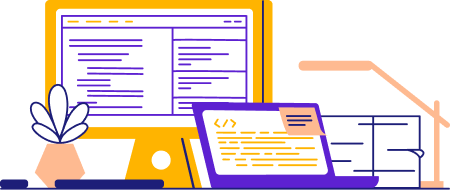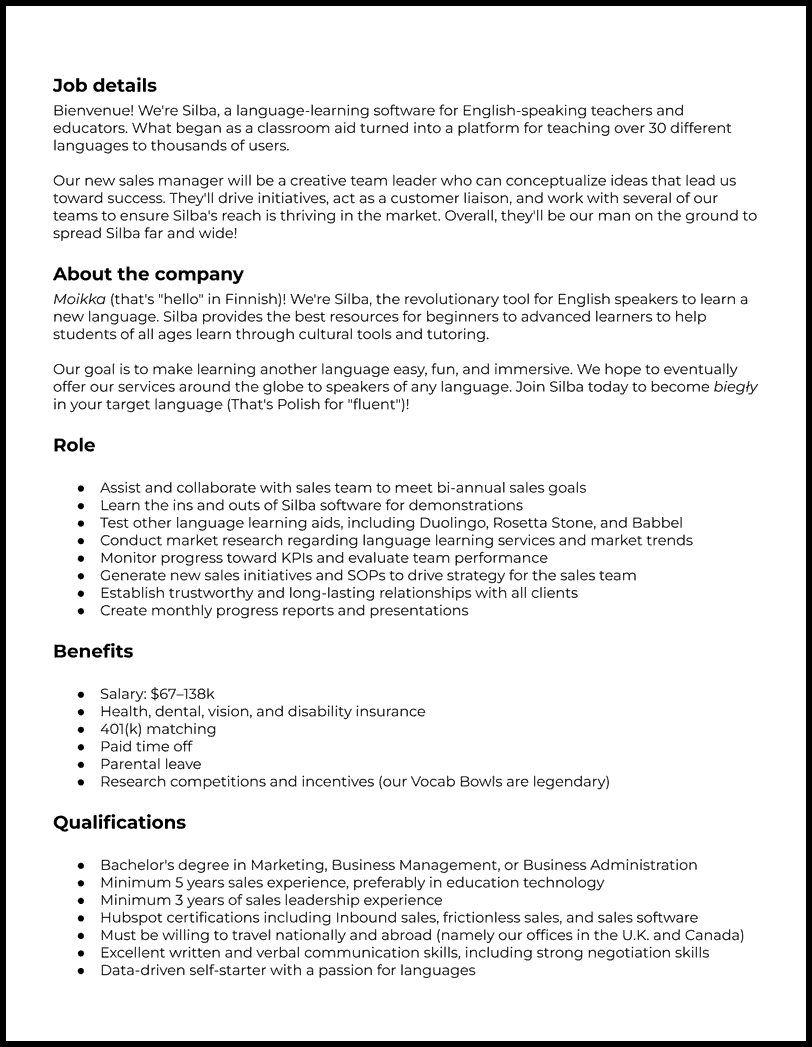Salespeople are perhaps the most important employees in a company besides the CEO. Even if you lured the best graphic designer or accountant, your company would sink if you didn’t sell your product or service. In the words of Henry Ford, “nothing happens until someone sells something.”
The best salespeople set goals and achieve them consistently with the help of research. But great salespeople know their most important asset is their integrity, and they genuinely believe in their product and job.
You can’t just hope you’ll get some great sales cover letters and resumes in your inbox, which is where BeamJobs steps in. We’ve got writing tips and suggestions so you can create the ideal job description and hire the best salesperson possible.
How to Write a Compelling Sales Job Description

Picture this: you’re on a wealthy executive team, watching a pitch for a new kitchen product. The salesperson is rambling, and all you’ve figured out from their lengthy speech is that they have a product. You don’t know what they want from you, and the speaker is vague whenever you ask questions.
Similarly, many job descriptions are vague, confusing, and either terribly long or shockingly short. Unfortunately, this scenario plays out far too often for job description readers. BeamJobs provides this guide to help you create a better job description that resonates with your audience and moves them to apply.
Sell it right from the start
Salespeople know that time is of the essence, so rambling off your company’s history or benefits at the beginning is a poor choice. What should the future salesperson know right away? Lead with the basics of who you work for and who you’ll be hiring.
Good salespeople care about their customers and their time, so you need to care about your applicants and tell them only what they need to know.
You also need to address why you’re hiring. Yes, you need a new salesperson. But why? Is there a gap in customers’ understanding of the company’s products? Are you looking to increase your customer retention rate? Your new hire should know exactly their role from day one.
Strategize concepts and write for your audience
Writing a great job description is like making a winning sales pitch: you need to strategize. Namely, that means keeping your audience in mind. What do applicants need to apply?
You already know to include why you’re hiring and who you are, but what else do you need to include? Our outline can help with general topics, but you’ll have to decide the details.
Test out ideas, replace content, and start anew if you must. Look at other job descriptions and see what works and what doesn’t (You’ve already seen three good examples in this guide). Once you’re happy with your overall concept, fill in details until it’s complete.
Analyze your sales job description
Your structure is perfect, and all your content is done. Most would say it’s time to call it a day, but salespeople know nothing is perfect the first time around. Go through your job description and cut anything irrelevant, vague, or hyperbolic. Applicants can detect lies from fancy language a mile away, so make sure you’re using plain and truthful language.
On that note, you should take a long look at your tone. You need to be honest, but you also need to be interesting. While your job description may be technically correct and beautifully formatted, it won’t convince salespeople to join you if it’s dull and dry.
One of the best ways to get a read on tone is to share your job description with others for feedback. (Bonus points if you can get some salespeople to read it). Take a break, and let your coworkers help you with constructive criticism.
Proofread for perfection
Then comes the hard part—taking constructive criticism. It’s hard to have others critique your work, but salespeople face rejection every day. Steel yourself to the comments and make the recommended edits for content, clarity, tone, and flow. If it starts feeling too painful, remember—this is all for the applicants, and it will be worth it.
Once you’ve strategized, written, revised, and perhaps revised again, all that’s left to do is adjust your formatting. Take a look at each draft to make sure the formatting translates well, avoiding weird spacing, overabundance (or lack) of white space, or excessive underlining of the text. Then hit submit, and sooner than you can say “sold!” you’ll be thumbing through a big stack of sales resumes.
Start with an Outline of Your Sales Job Description

With so much information to include, writing a job description can feel as intimidating as pitching a product on Shark Tank. Follow this outline to have everything you need and nothing you don’t so you can perfectly market your job to the best applicants.

Job details
This is the pitch for the job where you give the necessary information for the applicant to decide whether or not to keep reading. If they have to read your full job description to discover you need a sales director, you need to rewrite this section. Cover the three main things: the type of job, your organization, and why you’re hiring.

About the company
Salespeople need to know about the product, but they also benefit from knowing about the company. Although It can be tempting to go on about your company and accomplishments, remember to whom you’re selling; does the applicant need to know about your company’s lengthy history and list of credentials? Avoid waxing poetic for paragraphs and paragraphs. Be creative, concise, and introduce some of the company’s personality.

What you’ll be doing
It’s shocking how many sales job descriptions lack a requirements section since this is where you tell the applicant what their job will entail. Although sales jobs frequently share similarities, each position has unique tasks, so you need to include this section to show how this position is different from other roles.
On the note of being specific, make sure you are clear with each point. If the responsibilities are too vague, applicants may not apply out of confusion or fear of being underqualified.
- Utilize sales and marketing knowledge to build a strong pipeline through multi-channel communication
- Monitor progress toward sales KPIs and evaluate team performance
- Identify customer needs and offer information to fulfill that need
- Present monthly sales reports to executives and employees

Qualifications
This is the second most important section in your job description. Applicants need to know exactly what’s required to do the job, so they only apply for jobs they’re qualified to do. However, this doesn’t mean you should list every qualification you can imagine for your position; that can scare away applicants. The best course is to balance what’s essential to do the job and what can be learned through training.
- Associate’s degree in Finance, Marketing, or Business (Bachelor’s preferred)
- Minimum 5 years sales experience, preferably in education technology
- Intermediate experience with SalesForce and Microsoft Office Suite
- Organized and self-motivated

Benefits
This is where you should sell why applicants should work for your company. Although this section lists company perks, you’ll also want to list a salary range. This lets job seekers know more or less how they’ll be compensated, which promotes transparency. However, there’s a reason this section is listed so low—this is not the most important, so it should be detailed later.
The Roles and Functions of Salespeople

Sales blends into marketing and customer service, so salespeople must be the best in both worlds while keeping sales at the forefront of their position. Since the public tends to be wary of salespeople and sales professionals are aware of their reputation, they must prove they and their company are trustworthy. It’s a big job that involves many roles, but a good salesperson is up to the task.
Here are some common functions of excellent salespeople. One salesperson may not fulfill all of these roles, but they likely will face more than one on any given day.

Communicator
- Salespeople convince buyers to buy a service or product, so it stands to reason they must be excellent communicators. When it comes to negotiation and friendly discourse, salespeople are the best in the business world. They also know how to address concerns and complaints professionally and without fuss.
- Establish professional and friendly rapport with all customers, informing them of the benefits and drawbacks of relevant purchases, answering customer questions, and addressing/ solving complaints regarding products or services.
- Present monthly sales reports to executives and stakeholders, train new sales representatives and collaborate with other departments (such as marketing) to coordinate sales goals.
- This role will require strong interpersonal and verbal communication skills, excellent active listening abilities, and an amiable demeanor.

Relationship manager
- Like customer service, salespeople are masters of developing and maintaining good relationships. They know that trust, honesty, and kindness will earn more customer loyalty and continued purchases. The best salespeople genuinely want to help others and provide quality service, which means they need to form solid relationships.
- Provide quality customer service with a relaxed and welcoming demeanor, including answering customer questions and resolving complaints. Will also be required to cold call customers, interact via social media, and follow up after purchases.
- This role will require strong interpersonal communication skills and a friendly, open personality. Must show active listening skills and a driven attitude with a good sense of humor.

Researchers
- Salespeople make it look easy, but there’s a lot of research behind making a tough sale. It’s up to the salesperson to research the best practices and methods for helping customers and increasing revenue.
- Conduct market research, including in-person customer interactions and social media discovery, to determine current sales techniques and procedures, including social media trends. Must then analyze current sales metrics and develop new initiatives to boost sales and drive improved KPIs.
- This role will require superb time management, organization, written communication, and creative, critical thinking skills.

Informant
- Salespeople know their company’s products and services inside and out. They also gather information from customers to inform future business decisions, making them the ultimate liaison. If you don’t know the product, how are you supposed to sell it?
- Collaborate with employees and executives to learn the company brand, research the company’s products and services, and communicate with customers to identify their concerns and answer questions to help them make an informed decision. Must then share customer information with relevant employees and suggest changes for improvement.
- This role will require strong verbal communication skills, excellent organization, time management skills, and a driven, self-starter personality who can work equally well independently or on a team.

Recruiter
- Although it may not be the word’s traditional meaning, salespeople recruit new customers to establish a stronger sales pipeline. There’s even a sales position (called a prospector) whose sole job is to gain customers! It’s a big part of a salesperson’s role, so your new hire should excel in this skill.
- Cold call customers, email listed subscribers, and message prospects on social media. Will then establish a friendly rapport and engage customers in discussion regarding company products and services. Must be sensitive about when to continue or end conversations to ensure customer satisfaction.
- This role will require excellent interpersonal communication skills, solid negotiation ability, and high emotional intelligence.

Problem-solver
- Sometimes customers can’t buy the product or service due to obstacles; the salesperson’s goal is to remove as many of those roadblocks as possible. The University of Minnesota’s article lists numerous inspiring stories showing salespeople solving problems and eventually bringing their company another customer.
- Identify customers’ needs and present solutions to their problems using the company’s products or services. If the company’s products/services will not solve the customer’s problem, strive to find a solution that will result in a sale using all company resources at your disposal.
- This role will require expert verbal communication skills, negotiation abilities, and critical thinking skills.








